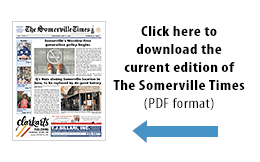Taking a closer look at this month’s notable city data
*

By Mayor Joseph A. Curtatone
(The opinions and views expressed in the commentaries and letters to the Editor of The Somerville Times belong solely to the authors and do not reflect the views or opinions of The Somerville Times, its staff or publishers)
Data-based decision making is at the core of how we develop policy and set priorities here at City Hall. Every day I check the latest 311 stats, and throughout the week we meet for in-depth review of departmental data and city trends. So from now on once a month rather than writing a traditional op ed I’d like to share some of the data I’ve been reviewing recently.
28,000: That’s the number of people in the United States that died of opioid overdoses in 2014 according to the Centers for Disease Control and Prevention. That’s four times the opioid deaths just 15 years earlier in 1999, and it appears that the heart-breaking trend upward is not slowing. Somerville is not immune, and the numbers we recently went over at our twice-monthly CrimeStat meeting are a tough reminder.
As of July 31, Somerville Police responded to 145 drug overdoses in 2016, 12 of which were fatal. That’s 12 lives that shouldn’t have been lost, and 12 families that shouldn’t be grieving. A year ago at the same time, there were 101 overdoses and 12 fatalities. We’re thankful deaths have not increased so far this year, but the near 50 percent increase in overdoses is very concerning. Of the 145 this year, 97 are believed to be related to opiates (versus 67 in 2015 at this time).
From equipping our officers with the opioid overdose antidote Narcan to helping residents access detox services and providing recovery coaches, the City is working to get needed help to members of our community facing the illness of addiction. On Oct. 1, we’re co-hosting an Addiction and Recovery Forum with the Massachusetts Organization for Addiction Recovery and the Cambridge Health Alliance.
Please join on Saturday, Oct. 1, at Tufts University, Barnum Hall, 163 Packard Ave., from 8:30 a.m. to 1 p.m. for discussions and workshops on topics including: Support for Loved Ones, Road to Recovery and Maintaining Sobriety, and Mental Health and Factors Impacting Sobriety. The forum is free to all. Please register at www.surveymonkey.com/r/2016addictionsforum.
756: That’s the number of temporary no parking permits the City issued to residents moving from the end of July through the Labor Day weekend. Each day, I check the City’s data dashboard watching for trends like this (you can see the same dashboard at www.somervillema.gov/datafarm/).
It’s no surprise that the Boston-area moving season is a busy time for Somerville. But watching the data keeps us on alert. I’ve directed the Department of Public Works, Traffic and Parking, and the Inspectional Services Department to stay on top of removing expired no parking signs as well as enforcing trash regulations after move outs.
Despite their hard work, keeping up with more than 700 moves is no easy task, and your help is always appreciated. If you happen to see an expired no parking sign, feel free to take it down. If you see trash that is blocking the sidewalk, out on a non-pickup day, or being stored in open containers, please let us know by calling 311. Then the data cycle will continue. Your call will be logged, it will show up in the Data Dashboard, and I’ll be taking a look at it the next morning.
7,000: That’s the number of people who attended our Ignite! Festival in August, which featured seven fire artists among other activities. That puts us at 1,000 visitors per fire artist. Meanwhile, 10,000 attendees enjoyed our last SomerStreets festival, which featured at 90-foot watery obstacle course slide—or roughly a little more than 1,000 people per 10-feet of water slide.
Here in Somerville we take pride in our festivals that showcase our community’s diverse and vibrant arts, music, and food culture. It’s obvious they are a fun way to gather with neighbors and enjoy the arts, but they also boost our local economy. A study conducted by the Somerville Arts Council found that for every dollar it spends on an event, that event generates approximately five to seven dollars in the community. Some of that benefit comes from dollars spent in our local establishments by our event visitors.
At our next SomerStreets event we’ll have eight all-female bands, professional wrestlers, and a trapeze artist. Let’s see if we can get to 1,000 people per band. For the fun of it, and for our local economy, bring a friend or family member and head to Highland Ave. for SomerStreets Strike Up the Bands on Sunday, Sept. 18, from 2 to 6 p.m.
















It is simply not true that “Data-based decision making is at the core of how we develop policy and set priorities here at City Hall.” You do not collect useful, computerized information on your existing programs. On home improvement loans, senior tax deferrals, subsidized solar installations, or de-leading for four examples, four share roughly the same information requirements on income and current conditions, yet all four are on paper, requiring far more work to collect, compare, analyze the value of any application, and far more time – of staff and of applicants – to prepare. A unified form could produce four different documents to meet state, city and national standards, while it also could document eligibility and impact to show the value of the services you and your citizen clients buy.
We are in an age when the city could consolidate applications like these, collecting income and expenses, housing conditions, age, family, sex, ethnicity, and other factors key to building more productive uses of limited city, state, and federal funds. If Somerville piloted a consolidated application that could generate specific formats required by different funding sources, Somerville could “sell” that application to other cities. Next time look a little more into your own data before citing simple 311 data.
Make what we’ve already got actually work to help us now and in the future, and collect real impact information to guide future programs, here and in other cities facing the same or similar problems.